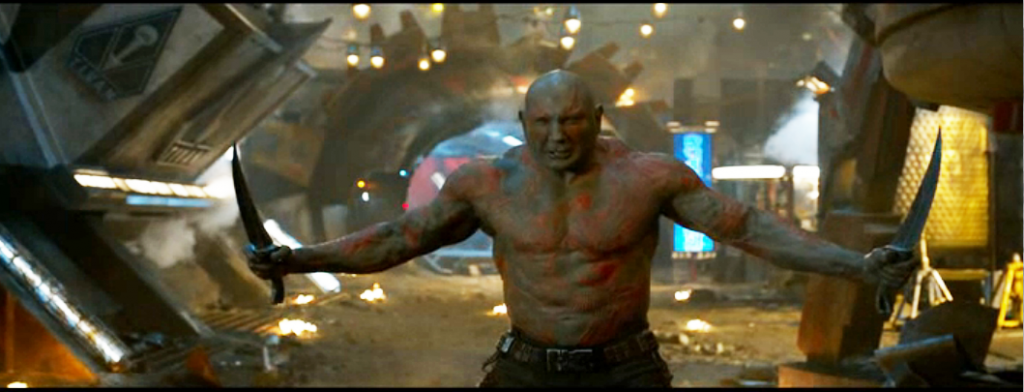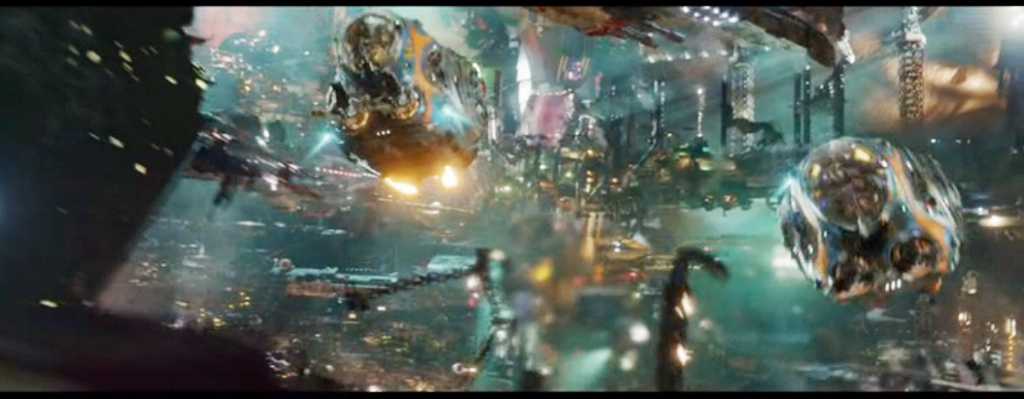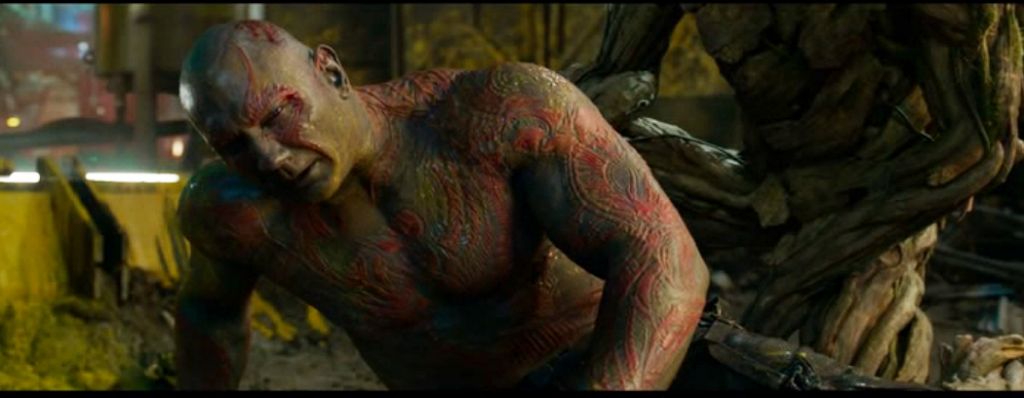Guardians of the Galaxy part 8
Now that Drax has put the lives of everyone in the galaxy at risk, it’s a good time to ask: What does Drax want?
Drax’s cinematic goal is “to kill Ronan,” that’s easy enough. But when he’s face to face with his nemesis and the moment of his fate is at hand, what happens is a repeat of the opening set-piece: the nemesis has no idea who the protagonist is. Drax’s goal, like Peter’s, is “to be taken seriously.” Or perhaps Drax would say “to be taken literally.” This, of course, is also Ronan’s goal, and, in his own way, Rocket’s (his brash anarchism, his lack of respect, masks [masks! Raccoon!] a deep despair and need for respect. A lot of characters in Guardians are just looking for a little respect, and you could even draw lines through the narrative, separating the characters looking for respect and the characters refusing to grant it. Even Nova Prime is granted little respect in the movie — the Kree ambassador hangs up on her, and her own underling is surprisingly blase as he sucks a mint or something while he reports to her. That makes a character like Yondu stand out, because he appears to neither grant nor need respect from anyone. Instead, he sees life as a series of conflicts, and an underling (like Peter) and a superior (like the Broker) are both mere obstacles for him. Again, the characters’ need and desire for respect links them to the movie’s meta-theme: the dumbest things (the shallow space-dude, the smart-mouth raccoon, the walking thesaurus) contain deep truths, which is why we love them the most.
At the movie’s mid-point, all the principals are gathered to fight over the orb. Peter and his gang, Ronan and his gang, plus Yondu and his gang. The set-piece of Act I, the orb-fight in the town square on Xandar, is here writ much, much larger, with flying machines out of (K)nowhere and massive property damage. Gamora has the orb in one pod, her sister Nebula chases after her with a gaggle of goons, Peter and Rocket engage in a demolition derby with pods of their own. Ronan, who wants the orb the most, does nothing; he easily brushes off Drax and goes back to posing.
Out in space, Gamora tries to appeal to Nebula’s sisterly love. She reminds her that Thanos will kill everyone, including Nebula, with the Infinity Stone, but Nebula shrugs off the warning: her need for Thanos’s approval, his respect, is literally worth more to her than life itself. She blows up Gamora’s pod, the orb is captured, oddly enough, by no one in particular (just a tractor-beam from one of Ronan’s ships), and Gamora is left helpless out in space. Peter is faced with a choice: save Gamora and surrender to Yondu, which will (theoretically) take him out of the game forever, or go on living and — what? Pursue the orb again, or head in the opposite direction of the crazy people who want to destroy planets? It would, perhaps, have been better if Peter’s choice had been to either save Gamora or pursue the orb, because the plan he settles on — save Gamora and bet that Yondu will pick him up in time to still live — involves a certain amount of risk but isn’t that much of a choice.
In any case, Peter’s reasoning for saving Gamora (“I saw you out there, and I don’t know what came over me”) is entirely in keeping with his character. He delivers his line straight — too straight — and Gamora sees it for what it is: a lead-in to some potential groping, devoid of any true heroism. And yet, Peter’s risk was real, and the moment is a complex turning point for him: as per his opening song, he’s halfway to being able to admit that he’s actually in love. Saving a woman’s life might be a bit of a risk for Peter, but admitting he’s in love, that’s the real risk.
While Peter saves Gamora to great fanfare, Groot nonchalantly saves Drax from a tank of goo like it ain’t no thang. Which, again, speaks to character: while Peter gets an orchestral flourish and much slow-motion and breathless declaration of heroism (by his own account), Groot simply does what has to be done, which is actually the truer heroism. A man who declares himself a hero is a braggart, a hero is the one who acts without expectation of reward.
Drax, like Peter, has, in his near-death experience, experienced a change of heart. Unlike Peter, Drax has now been humbled by his encounter with his nemesis. When Peter is humiliated by Ronan’s goons and the Nova Corps about his Starlord name, he responds by giving them the finger. When Drax is humiliated by Ronan’s non-memory of him, he becomes deeper. He realizes that the pain he feels over the loss of his family is his own, it affects no one else, the galaxy owes him nothing, and, on a profound level, he is nothing. Rocket, not one to respect a man even at his most reflective, piles on. “Everyone’s got dead people,” he sneers, a line that could have been uttered by Clint Eastwood at his most fatalistic, easily the equal of Unforgiven‘s “Everybody’s got it comin’ kid.”
Unusually, at the mid-movie mark, Guardians hits what would usually be the end-of-Act-II Low Point. The gang is scattered, their motivations for setting the plot in motion have been erased, more than half of them have died and come back to life. Peter no longer has his lever against Yondu, Gamora no longer has the key to her sense of self-worth, Drax no longer has his sense of destiny, Rocket and Groot no longer have their prisoner. There is no reason for anyone to do anything at this point, and Rocket, the pragmatist, is all for lighting out for the territories and letting the crazy people be crazy to each other. It is Groot, the simple one, the one who gives flowers to children and saves lives as a matter of course, who turns the tide. He doesn’t want “to get the orb,” he only wants to rescue Peter and Gamora from Yondu (although it’s unclear how much danger Peter is in from his employer – Yondu seems like the gruff-but-lovable type, the guy who likes to yell at people, but also has cute kitschy tchotchkes on his dashboard, a tiger with the heart of a kitten). And he wishes to rescue Peter and Gamora not for any possible reward, but because they are friends. What Groot suggests is a huge turning point for the movie: while everyone else puts on a hip, cool, crusty front, denying their need for love and connection, Groot is perfectly willing to admit that he is in love.



Buddhists might call Groot a Bodhisattva. He embodies transcendent ( self-less) virtues and he literally re-incarnates. 🙂
I was happily astounded when I discovered Groot was portrayed by Vin Diesel. By the bye, Vin comes from a family of Westbeth artists.
It’s funny that you bring up Buddhism because the line “Everyone’s got dead people” reminded me of this story:
http://www.buddhanet.net/e-learning/buddhism/bs-s03a.htm
Would that make Groot a Bodhi Tree?
Yea! I think so.
Walking tree not afraid to put down roots.